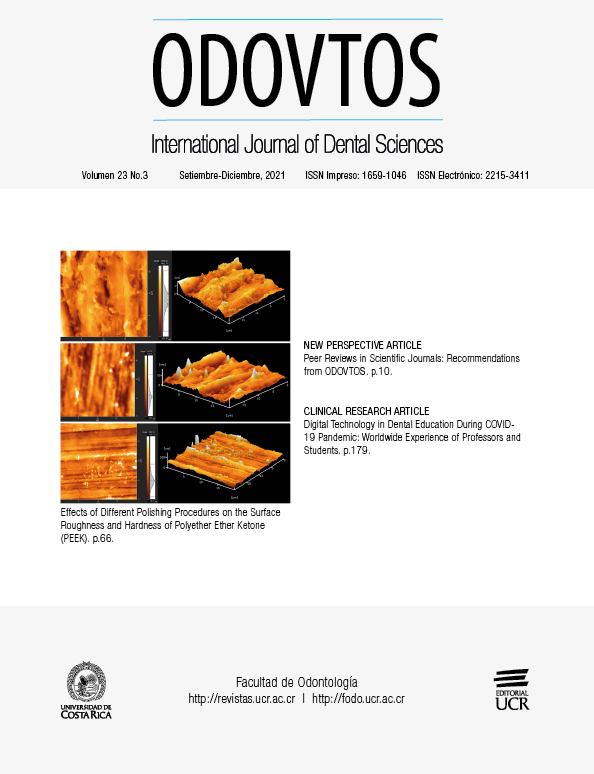Abstract
The aim of this study was to determine the average age and sequence of eruption of permanent dentition in the school population of the province of Cartago, Costa Rica. Methods: A cross-sectional observational study included children between the ages of 5 and 12 from public and private schools. Clinical examination was performed, and the presence or absence of permanent teeth recorded. Statistical analysis: An estimation of means of eruption was used through binary variables, building the probabilities of the presence of a dental piece through a logistic regression. Results: 833 children were examined: 433 (51.90%) girls and 400 (48.10%) boys. The permanent teeth erupt first in the female sex; however, this difference is not statistically significant. The maxilla eruption sequence for girls was 6-1-2-4-3-5-7 on both sides; for boys, the sequence of eruption was 6-1-2-4-5-3-7 for the right side and 6-1-2-4-3-5-7 for the left side. In the jaw, the sequence in boys was 6-1-2-3-4-5-7, and in girls, 1-6-2-3-4-5-7. Conclusions: For the first time, at the Central American Level, the pattern of permanent dentition eruption could be established. The age of permanent dental eruption does not vary according to sex in this population.
References
Chaitanya P., Reddy J.S., Suhasini K., Chandrika I.H., Praveen D. Time and Eruption Sequence of Permanent Teeth in Hyderabad Children : A Descriptive Cross-sectional Study. Int J Clin Dent. 2018;11 (4): 330-7.
Wong H.M., Peng S.M., Wen Y.F., McGrath C.P.J. A population survey of early factors associated with permanent tooth emergence: findings from a prospective cohort study. Community Dent Oral Epidemiol. 2016; 44 (5): 467-75.
Alqahtani S.J., Hector M.P., Liversidge H.M. Brief Communication : The London Atlas of Human Tooth Development and Eruption. 2010; 490: 481-90.
Evangelista S., Regina K., Vasconcelos F., Xavier A., Oliveira S., Luiz A., et al. Timing of Permanent Tooth Emergence is Associated with Overweight / Obesity in Children from the Amazon Region. Braz Dent J. 2018; 29 (5): 465-8.
Shiyan H., Nanquan R., Shuhao X., Xiaobing L. [Research progress on the cellular and molecular mechanisms of tooth eruption]. Hua xi kou qiang yi xue za zhi=Huaxi kouqiang yixue zazhi=West China J Stomatol. 2016 Jun; 34 (3): 317-21.
Wise G. Cellular and molecular basis of tooth eruption IR ID. Orthod Craniofac Res. 2009; 12 (2): 67-73.
Bruna del Cojo M., Gallardo Lopez N.E., Mourelle Martinez M.R., De Nova Garcia M.J. Time and sequence of eruption of permanent teeth in Spanish children. Eur J Paediatr Dent. 2013 Jun; 14 (2): 101-3.
Shaweesh A.I. Timing and sequence of emergence of permanent teeth in the Jordanian population. Arch Oral Biol [Internet]. 2012; 57 (2): 122-30. Available from: http://dx.doi.org/10.1016/j.archoralbio.2011.08.014
Jayatileke A., Nawarathna L.S., Ravishanker N., Wijekoon P., Nawarathna R.D., Vithanaarachchi V.S.N., et al. New standards for eruption time and sequence of permanent dentition in Sri Lankan children. Commun Stat Case Stud Data Anal Appl [Internet]. 2019; 5 (2): 92-100.
Available from: https://doi.org/10.1080/23737484.2019.1579075
Oznurhan F., Ekci E.S., Ozalp S., Deveci C., Delilbasi A.E., Bani M., et al. Time and sequence of eruption of permanent teeth in Ankara, Turkey. 2016; 26 (1): 1-7. Available from: http://dx.doi.org/10.1016/j.pdj.2015.09.002
Almonaitiene R., Balciuniene I., Tutkuviene J. Standards for permanent teeth emergence time and sequence in Lithuanian children, residents of Vilnius city. Stomatol Balt Dent Maxillofaxicial J [Internet]. 2012; 14 (3): 93-100. Available from: http://www.ncbi.nlm.nih.gov/pubmed/23128492
Kanagaratnam S., Schluter P.J. The age of permanent tooth emergence in children of different ethnic origin in the Auckland region: a cross-sectional study. N Z Dent J. 2012 Jun; 108 (2): 55-61.
Bruna M., Gallardo N., Mourelle M., Nova M. Time and sequence of eruption of permanent teeth in spanish children. Eur J Paediatr Dent. 2013; 14 (2): 101-3.
Esan T.A., Mothupi K.A., Schepartz L.A. Permanent tooth emergence: Timing and sequence in a sample of Black Southern African children. Am J Phys Anthropol [Internet]. 2018; 167 (4): 827-39. Available from: http://doi.wiley.com/10.1002/ajpa.23714
Moyers R.E. Standards of human occlusal development. 1st ed. Ann Arbor, Mich.: Center for Human Growth and Development, Univ. of Michigan; 1976. 371 p.
Dashash M., Al-Jazar N. Timing and sequence of emergence of permanent teeth in Syrian schoolchildren. J Investig Clin Dent [Internet]. 2017; 1 (September): e12311. Available from: http://doi.wiley.com/10.1111/jicd.12311
Lewis A.B., Garn S.M. The Relationship Between Tooth Formation and Other Maturational Factors. Angle Orthod. 1960; 30 (2): 70-7.
Makino E., Tsujino K., Ishii T., Shintani S., Sueishi K. Difference in Bilateral Timing of Eruption of Permanent Teeth. Bull Tokyo Dent Coll [Internet]. 2018; 59: 277–84. Available from: https://www.jstage.jst.go.jp/article/tdcpublication/advpub/0/advpub_2018-0009/_article
Moslemi M. An epidemiological survey of the time and sequence of eruption of permanent teeth in 4-15-year-olds in Tehran, Iran. Int J Paediatr Dent. 2004; 14 (6): 432-8.
Lakshmappa A., Guledgud M.V., Patil K. Eruption times and patterns of permanent teeth in school children of India. Indian J Dent Res. 2011; 22 (6): 755-63.
Pérez C.M., Fernández R.L., Pennini J.A. Brote dentario y estado nutricional en niños de 5 a 13 años. Medisur. 2009; 7 (1): 1-7.
Kim C., Hong Y., Han D-H, Hong H-K, Kim Y-N, Bae K-H. A prospective cohort study on emergence of permanent teeth and caries experience in Korean children. Int J Paediatr Dent. 2011; 21 (4): 254-60.
